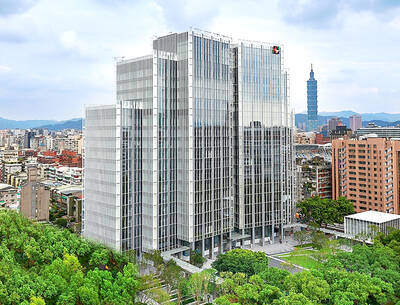Mosel Vitelic Inc (茂矽), parent of the nation's second-largest memory-chip manufacturer ProMOS Technologies Inc (茂德科技), managed to reduce a predicted 2003 loss of NT$8.3 billion by 45 percent to just NT$4.6 billion, the company told the TAIEX in a statement yesterday morning.
But the better-than-expected result does not mean that cash-strapped Mosel is out of the woods yet, as much of the improvement may have come from selling off assets in its core dynamic random access memory (DRAM) chip manufacturing business, analysts said.
"The reason that Mosel has revised its earnings/loss is that it sold its DRAM operating assets to ProMOS just before Christmas," said Alfred Ying (應宗傑), an analyst at BNP Paribas in Taipei. "Because of this Mosel booked a big profit."
Mosel's shares rose NT$0.13, or 6.1 percent, to close at NT$2.28 on the TAIEX following the announcement.
On Christmas Eve, Mosel spokeswoman Peng Chuo-lan (彭卓蘭) said the company planned to sell its DRAM business -- including 100 percent of US subsidiary United Memories Inc and 50 percent of Mosel Vitelic (US) Corp -- to ProMOS for US$120 million.
Before the sale of its DRAM assets, Mosel had seen a surge in DRAM sales, reporting memory chip revenue of NT$4.6 billion in October and November -- more than double the same two-month period a year earlier. Mosel is also selling more chips on behalf of ProMOS after its former partner, Germany's Infineon Technologies AG, pulled out of the joint venture last year over a dispute about who would control the chipmaker.
But with no manufacturing base, Mosel has lost its major revenue generator.
"Starting from the sale of its DRAM assets to ProMOS, Mosel's sales will not include DRAM chips and will therefore see a rapid decline," Ying said. "I'm still not very positive about Mosel's future. Its only option is to sell shares in ProMOS."
Another analyst was slightly more optimistic for the company's prospects this year, saying that its shares in ProMOS would ensure its survival.
"Mosel's problems are gradually being eased as it still has a lot of shares in ProMOS which they can continue to liquidate to create cash to repay its debts," said James Huang, (
Only last Friday, Mosel applied to sell 200 million shares in ProMOS to raise money to pay off its remaining debt. Mosel aims to hold just over 600 million shares in ProMOS after the sale, the statement said.
In the spring and summer of last year, Mosel had to apply to creditors to restructure almost NT$6 billion in overdue debt that it could not repay.

UNCERTAINTY: Investors remain worried that trade negotiations with Washington could go poorly, given Trump’s inconsistency on tariffs in his second term, experts said The consumer confidence index this month fell for a ninth consecutive month to its lowest level in 13 months, as global trade uncertainties and tariff risks cloud Taiwan’s economic outlook, a survey released yesterday by National Central University found. The biggest decline came from the timing for stock investments, which plunged 11.82 points to 26.82, underscoring bleak investor confidence, it said. “Although the TAIEX reclaimed the 21,000-point mark after the US and China agreed to bury the hatchet for 90 days, investors remain worried that the situation would turn sour later,” said Dachrahn Wu (吳大任), director of the university’s Research Center for

Alchip Technologies Ltd (世芯), an application-specific integrated circuit (ASIC) designer specializing in artificial-intelligence (AI) chips, yesterday said that small-volume production of 3-nanometer (nm) chips for a key customer is on track to start by the end of this year, dismissing speculation about delays in producing advanced chips. As Alchip is transitioning from 7-nanometer and 5-nanometer process technology to 3 nanometers, investors and shareholders have been closely monitoring whether the company is navigating through such transition smoothly. “We are proceeding well in [building] this generation [of chips]. It appears to me that no revision will be required. We have achieved success in designing

PROJECTION: KGI Financial said that based on its foreign exchange exposure, a NT$0.1 increase in the New Taiwan dollar would negatively impact it by about NT$1.7 billion KGI Financial Holding Co (凱基金控) yesterday said its life insurance arm has increased hedging and adopted other moves to curb the impact of the local currency’s appreciation on its profitability. “It is difficult to accurately depict the hedging costs, which might vary from 7 percent to 40 percent in a single day,” KGI Life Insurance Co (凱基人壽) told an investors’ conference in Taipei. KGI Life, which underpinned 66 percent of the group’s total net income last year, has elevated hedging to 55 to 60 percent, while using a basket of currencies to manage currency volatility, the insurer said. As different

Taiwanese insurers are facing difficult questions about the damage of recent swings in the New Taiwan dollar. Regulators might have a partial solution: letting firms change how they calculate the value of foreign currency assets. The Financial Supervisory Commission (FSC) is considering allowing insurers to use six-month average exchange rates when they calculate risk-based capital in their semiannual reports, a shift from the current system where insurers use exchange rates on the final day of reporting. The change could ease pressure on the US$1.2 trillion insurance sector, whose huge exposure to foreign assets came into the spotlight earlier this month after a